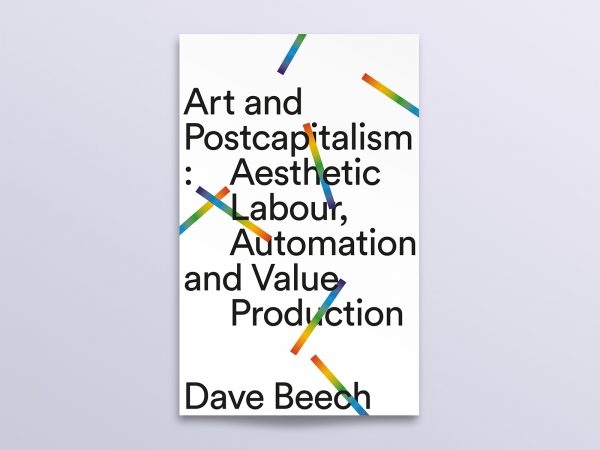Postcapitalism – what shape human society takes after capitalism – has been the central preoccupation of anticapitalists even since before Marx and Engels wrote the Communist Manifesto (1848). But if ‘communism’ is out of favour among today’s anticapitalists, ‘postcapitalism’ has taken its place, popularised (in the UK at least) by authors such as Aaron Bastani, Paul Mason and Nick Srnicek and Alex Williams. In an era in which capitalism seems only to work people harder and for dwindling reward, the clamour for some sense of what could replace it has gained new momentum.
The site of work, labour and production is increasingly thematised in contemporary art: in calls for artists wages, or in socially engaged practices that deal with alternative ways to produce art collectively or emphasise art’s social ‘usefulness’. But as Marxist critic Dave Beech argues, while today’s art is ‘replete with critical practices’, it ‘typically lacks a clear understanding of the difference between resisting the existing social system and superseding it’.
In Art and Postcapitalism, Beech examines art’s relation to work in the light of contemporary postcapitalist thought about a future in which machines do the work, leaving humanity to a life of leisure. To do so, Beech retraces the history of leftwing debates about work under capitalism, alongside art’s historical questioning of artistic labour: in the distinction of crafts from the fine arts; and of the avant-garde’s rebellious association with worker and machine – the complicated story of art’s simultaneous ‘complicity with, and hostility to, capitalism’.
Beech understands that ‘what matters for postcapitalism is not the elimination of a certain kind of work (e.g. factory production) but the elimination of a certain social relation (capital-labour)’. It’s not the character of the work people do, but that capitalism demands work not for the human value of what is produced but for the surplus that can be extracted (‘value production’) for the capitalist.
Art has long been marked by contradictions on the site of labour: between free creativity and commercial necessity, mechanical and intellectual work, and the artist’s torn loyalty between patron and popular audience. Beech convincingly retells the way in which the ‘liberal arts’ of the Enlightenment took shape precisely as a rejection of artisanal, repetitive craft labour, while tracing the mutations of this into the nineteenth-century romantic celebration of the artist’s indifference to commerce, the descendant of which Beech finds in the cultivated, knowing idleness of Duchamp. Beech perceptively criticises those who demand the status of ‘worker’ in the cultural industries of neoliberalism; while he sympathises with campaigns like W.A.G.E., he makes no friends by pointing out, correctly, that ‘the artist’s wage is more accurately understood… as wealth justified by the status of art’. Beech rightly challenges the naivety of ‘accelerationist’ leftists like Srnicek, Williams and others in their belief that postcapitalism might be defined by ubiquitous automation, since this could equally be true of near-future capitalism, and takes shots at the bizarrely influential posthuman nihilism of ‘rightwing’ accelerationist thinker Nick Land, who prefers to believe that automation will not so much abolish human work as abolish humans altogether.
Nevertheless, the weakness of Beech’s argument lies partly in its confusion over what people have invested, historically, in the idea of art (and a society after capitalism) as a space for self-directed action and self-determination – in other words, freedom. If Beech rails against the aristocratic privilege that is supposed to lurk in Oscar Wilde’s celebration of aestheticised labour – that ‘it is mentally injurious to man to do anything in which he does not find pleasure’ – he cuts himself off from the popular aspiration not to be forced to work while wishing for material plenty. It’s perhaps why, throughout his lopsided assault on aesthetic labour, Beech studiously avoids one of Marx’s more celebrated lines, in The German Ideology (1932): communist society ‘makes it possible for me to do one thing today and another tomorrow, to hunt in the morning, fish in the afternoon, rear cattle in the evening, criticise after dinner, just as I have a mind’.
What Beech misses in concluding that ‘art is not the prototype of labour freed from value production’ is that art is an individuated, partial realisation of self-determination, in a world in which self-determination is impossible. The true test of postcapitalism (communism, in fact) isn’t merely the abolition of value production, but the democratisation of control over material production by everyone in society, to suit their collective and individual interests. This is neither work nor idleness, narrowly defined, but the creative self-determination of the whole of a society by and for its members – an ‘ongoing work in progress’, or the biggest Gesamtkunstwerk of them all.
Art and Postcapitalism: Aesthetic Labour, Automation and Value Production, by Dave Beech | Pluto Press, £19.99 (softcover)
From the December 2019 issue of ArtReview
